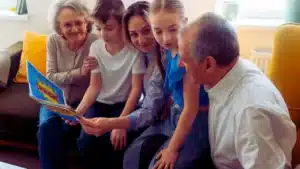While formal education largely deals with theoretical information, What is life skills education between classroom knowledge and the practical issues in daily life. Life skills learning and implementation are a must for any child, adolescent, or adult for personal empowerment, emotional intelligence, and contributing to society.
Understanding Life Skills Education in the Contemporary World

What is life skills education. It is the systematic method of equipping individuals with relevant skills that enable healthy living, emotional intelligence, and sound decision-making. The skills are not subject-based or profession-based but transcend all paths of life in helping individuals improve their own lives, studies, and careers. In contrast with test-driven education or rote memorization, life skills education teaches actual life skills such as stress management, empathy, critical thinking, and communication. It seeks to mold good citizens who can respond positively to the challenges of daily life.
The True Meaning of What Is Life Skills Education

Life education is also referred to as learning learning skills that enable individuals to cope and conduct themselves appropriately so that they can solve challenges and demands with ease and effectiveness in life. These are not biological but acquired habits that have to be learned for coping with every phase of life, whether in the family, school, workplace, or society in general.
It consists of mental, emotional, and interpersonal abilities that usher in well-being and enable one to make quality choices in times of adversity.
Key Elements of Life Skills Education
Important components of life skills education include critical thinking, effective communication, decision-making, and management of emotions. Life skills education equips individuals with the skills they need to meet challenges with confidence and develop healthy relationships in everyday life.
| Core Skill | Purpose |
| Self-Awareness | Helps understand strengths, weaknesses, and self-value. |
| Empathy | Builds understanding of others’ feelings and perspectives. |
| Communication Skills | Enhances speaking, listening, and expression effectively. |
| Decision-Making | Encourages evaluating options before making choices. |
| Problem-Solving | Enables handling unexpected and complex situations. |
| Creative Thinking | Promotes innovation and out-of-the-box solutions. |
| Critical Thinking | Helps analyze facts and assess outcomes logically. |
| Coping with Emotions | Supports managing anger, sadness, and joy healthily. |
| Coping with Stress | Teaches how to relax and overcome anxiety or fear. |
Why Life Skills Are More Important Than Ever

Academic success alone cannot make a person’s life successful in the real sense in today’s high-tech digital age. Growing mental illness, job pressure, and worsening relationships demand life skills that provide balance and emotional stability to life. Educating life skills at an early stage helps children to face peer pressure, reduce their anxiety level, and enhance self-esteem.
Moreover, employers also want employees who possess sound interpersonal and emotional abilities. Technical expertise alone is no longer enough; leadership, teamwork, and adaptability are now accorded high value in the workplace.
Practical Uses of Life Skills Education in Daily Life
Life skills training influences several dimensions of social and personal well-being. It enhances decision-making, family relationships, academic performance, and risk-taking behavior. Life skills also facilitate inclusivity, appreciation of diversity, and conflict resolution through peace in a multicultural society.
| Area of Life | How Life Skills Help |
| School & Education | Increases focus, creativity, and learning engagement. |
| Family Relationships | Promotes communication and emotional bonding. |
| Workplace | Enhances collaboration, leadership, and time management. |
| Mental Health | Reduces anxiety, builds resilience, and encourages a positive outlook. |
| Social Interaction | Encourages empathy, inclusion, and effective conflict resolution. |
| Decision Making | Supports responsible choices regarding career, lifestyle, and health. |
How Life Skills Education is Delivered Across Age Groups

Life skills education is not a programmed formula. It is age-related, maturity-dependent, and culturally appropriate. For kids, it is taught in the context of stories, play, and interactive games. Adolescents learn life skills in the context of workshops, group work, and role-play exercises. Adults learn life skills through leadership coaching, workplace training, and mental health programs. This interactive delivery ensures that people at any point in life get these essential skills in a form that they are able to comprehend and utilize successfully.
Innovative Solutions for Life Skills Acquisition
The modern education system is now integrating life skills into its curriculum in new ways. Gamification, digital storytelling, role-play, and experiential learning are gaining popularity. Some schools also include mindfulness sessions and peer mentorship classes to develop emotional skills and self-regulation in children. The integration of community-based learning has also been effective, whereby students learn from real-world problems and apply problem-solving or leadership skills in the moment. This gives them a sense of purpose and responsibility.
Global Relevance and Advocacy for Life Skills Education
International organizations like the WHO, UNICEF, and UNESCO place a strong focus on FAQs About What Is Life Skills Education in a holistic manner. Some governments have launched policies of incorporating life skills into national curricula. Quality education, such as the acquisition of life skills, is stated in the UN’s Sustainable Development Goals. Life skills education is today not just viewed as personal growth but also as a promoter of global peace, social justice, and economic development.
Wrapping Up
In this modern age, where achievement is dependent on emotional stability and adaptability rather than grades, life skills are your actual superpower. Life skills are for anyone from small children to corporate executives. Whether you want to lead, connect, grow, or simply live more at peace and with purpose, life skills training shows the way. And now you have information and skills that most others are still looking for.
FAQs
What is the fundamental purpose of teaching life skills?
The overall objective is to empower individuals to manage life problems effectively and make healthy decisions. It facilitates emotional well-being, social adaptation, and personal success in all spheres of life.
Can life skills be taught at home?
Yes, parents play a very important role. Through daily interaction, assignments, and healthy role modeling, parents can impart fundamental life skills like empathy, communication, and problem-solving.
When is the ideal age to start teaching life skills?
Life skills may be introduced as early as preschool with age-specific activities for the child. Early learning enables children to be socially aware and emotionally intelligent as they mature.
How is life skills education different from academic education?
Academic education deals with book learning, while life skills education imparts practical life skills in decision-making, emotional control, and interpersonal effectiveness.
Do life skills assist in career development?
Communication, teamwork, and flexibility are all very useful workplace skills and can lead to leadership potential and career success.
Can education on life skills be used to improve mental health?
It improves control of emotions, reduces worry, enhances resilience, and is therefore a valuable tool for promoting the mental well-being of children and adults.
How can schools best incorporate life skills programs?
Schools can prepare teachers, integrate life skills in the curriculum, hold special seminars, and implement interactive methods like role-plays and group discussions to render learning a fun process.








